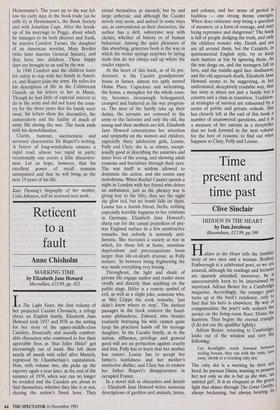Reticent • to .a fault
Anne Chisholm
MARKING TIME by Elizabeth Jane Howard Macmillan, £15.99, pp. 452 In The Light Years, the first volume of her projected Cazalet Chronicle, a trilogy about an English family, Elizabeth Jane Howard took 1937 and 1938 as the setting for her story of the upper-middle-class Cazalets, financially and socially comfort- able characters who continued to live their agreeable lives as 'that feller Hitlef' got increasingly out of hand. She left them nearly all awash with relief after Munich, reprieved by Chamberlain's capitulation. Now, with volume two, she picks up the tapestry again a year later, at the end of the summer of 1939, when war can no longer be avoided and the Cazalets are about to find themselves, whether they like it or not, sharing the nation's finest hour. They reveal themselves as staunch, but by and large unheroic; and although the Cazalet novels may seem, and indeed in some ways are, as conventional as their characters, the author has a deft, subversive way with clichés, whether of history or of human behaviour. Among the quiet pleasures of this absorbing, generous book is the way in which the writer springs surprises by laying trails that do not always end up where the reader expects.
At the heart of this book, as of its pre- decessor, is the Cazalet grandparents' house in Sussex, almost too aptly named Home Place. Capacious and welcoming, the house, a metaphor for the whole coun- try, becomes increasingly beleaguered, cramped and battered as the war progress- es. The men of the family take up their duties, the servants are removed to the army or the factories and only the old, the young and their mothers are left. Elizabeth Jane Howard concentrates her attention and sympathy on the women and children, especially three adolescent girls, Louise, Polly and Clary; she is, as always, except- ionally good at describing the anxieties and inner lives of the young, and showing adult evasions and brutalities through their eyes. The war itself is seldom allowed to dominate the action, and she resists easy melodrama. When Rachel Cazalet spends a night in London with her friend who drives an ambulance, just as the phoney war is giving way to the blitz, they see the night sky glow red, but no bomb falls on them. Louise has a Jewish friend, Stella; nothing especially horrible happens to her relations in Germany. Elizabeth Jane Howard's sharp ear for the casual prejudices of pre- war England surface in a few unattractive remarks, but nobody is seriously anti- Semitic. She recreates a society at war in which, for those left at home, mundane deprivations and preoccupations loom larger than life-or-death dramas; as Polly notices, 'In between being frightening the war made everything very boring .'
Throughout, the light and shade of private life engage author and reader more vividly and directly than anything on the public stage. Hitler is a remote symbol of evil, as well as a slight joke, someone who, as Mrs Cripps the cook remarks, 'just didn't know where to stop'. The darkest passages in the book concern the hand- some philanderer, Edward, who besides routinely betraying his wife cannot quite keep his practised hands off his teenage daughter. In the Cazalet family, as in the nation, affluence, privilege and general good will are no protection against cruelty and loss. Polly has to learn that her mother has cancer; Louise has to accept her father's lustfulness and her mother's instinctive dislike; and Clary has to endure her father Rupert's disappearance in occupied France.
In a novel rich in characters and details — Elizabeth Jane Howard writes sensuous descriptions of gardens and animals, tastes,
and colours, and her sense of period is faultless — one strong theme emerges. When does reticence stop being a question of manners, or a form of courage, and start being repressive and dangerous? The book is full of people dodging the truth, and only the children wonder why. Death and sex are all around them, but the Cazalets, in quintessential English style, try to keep such matters at bay by ignoring them. As the war drags on, and the teenagers fall in love, and the middle-aged face disillusion, and the old approach death, Elizabeth Jane Howard seems to be suggesting, in her understated, deceptively readable way, that her story is about not just a family but a country and a class in transition. Tradition- al strategies of survival are exhausted by a series of public and private ordeals. She has cleverly left at the end of this book .a number of unanswered questions, and it is a measure of her success as a storyteller that we look forward to the next volume for the best of reasons; to find out what happens to Clary, Polly and Louise.










































































 Previous page
Previous page